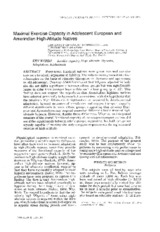| dc.description.abstract | ABSTRACT
Forty-seven highland natives were given maximal exercise tests on a treadmill ergometer at 3,600 m. The subjects were grouped into four subsamples on the basis of ethnicity (European vs. Aymara) and age (young vs. old adolescent). Two-way ANOVA indicated that VO2max adjusted for body size did not differ significantly between ethnic groups but was significantly larger in older than younger boys within each ethnic group (p less than .05). This finding does not support the hypothesis that Amerindian highland natives have adapted genetically to hypoxia but is consistent with the hypothesis that the relatively high VO2max's of highlanders are acquired by developmental adaptation. Several measures of ventilation and oxygen transport capacity differed significantly between ethnic groups, suggesting that growing European and Aymara boys may respond somewhat differently to the stress of high-altitude hypoxia. However, despite these differences, VO2max, an integrated measure of the overall functional capacity of the oxygen transport system, did not differ significantly between ethnic groups, suggesting that both groups are equally capable of meeting the body's oxygen requirements during maximal exercise at high altitude. | es_ES |

